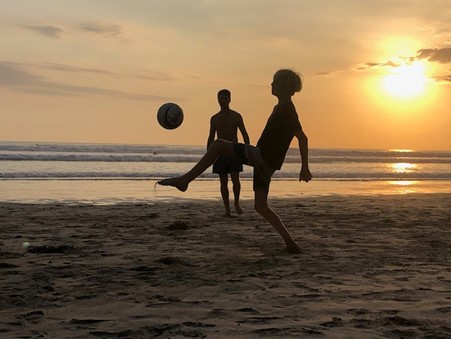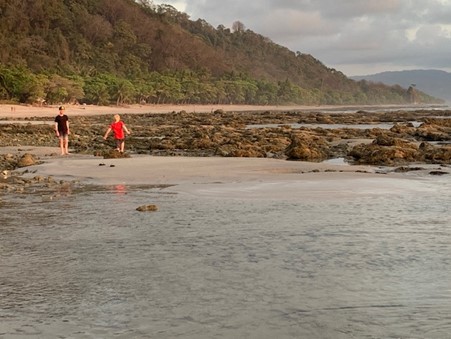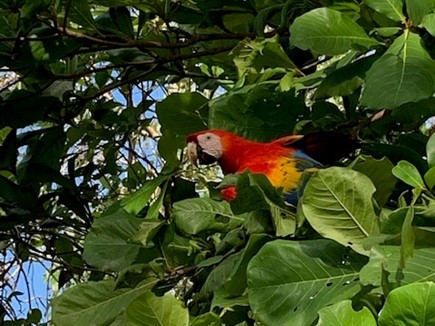Have you ever wondered what it would be like to have a tutor join your family residentially?
22nd October, 2021
The Clark family share their experiences in Costa Rica with Danny, their tutor introduced by Enjoy Education
by Enjoy Education parent Harriet Clark | www.hettyclark.com @hettyclarkmusic

In 2021, after 8 years in the enthralling city of Los Angeles, Covid struck and schools throughout California closed. There was a strange sense of calm as our boys, Angus, 13, and Kit, 10, got to grips with learning via Google Classroom. My tech naysayer self had to admit that had technology not already been a part of their school day they would not have been able to make the switch so easily to Zoom learning.
After just a few weeks I could see that online learning had limitations. Ideally at school or home school, children learn in a multi-modal way using kinesthetic, visual, auditory and reading/writing. Zoom school offered an amazing virtual classroom, but some crucial elements were missing. Imaginative play time in the playground was lost, along with the opportunities for being social. The overload of passive, stationary hours staring at a screen took away their sense of agency. Anyone used to Zoom meetings knows how draining it is keeping track of communication via multiple faces on a screen. My boys, like so many children, quickly began to disengage with their learning.
With schools not opening any time soon and work remaining virtual, my husband and I planned to go to Costa Rica. I contacted Enjoy Education and had a great conversation with Kate Shand, the founder of Enjoy. I felt a weight lifted talking to Kate, for she helped me see how if we had a residential tutor working one-on-one with our boys, they would make real educational strides. She helped me to see that a residential tutor in Costa Rica would provide an accelerated learning experience because their learning would be highly personalised. We were also planning to move back to the UK, so this residential opportunity would also help to plug any gaps between the US educational system and the UK.

Here are my 4 parent top tips to prospective families thinking about a residential tutor:
1. Make sure you choose carefully a tutor to match your child’s personality, and the overall personality of your family. As the tutor may be living in, you need to all be comfortable in each other’s presence, so take your time to choose the tutor according to the needs of your child and the style of your family.
2. Have a clear plan and set goals with your tutor at the start of the residential. Involve your child with the planning of what they are going to learn so that they have a sense of agency and their voice is being heard. When Danny asked our boys what they hoped to get out of their time in Costa Rica, it made our boys much more engaged.
3. Agree ahead of time a clear structure for each day at the end of each day. Again, with our boys, they were involved in this. This really helped develop their organizational skills, so that they knew what they were doing each day. They had plenty of small breaks too to re-energize during the day.
4. The academic goals you have for your child should be well met and I would say prepared to be surprised by the many other skills your child may develop.
Our boys gained so much more than academics alone. They loved the experience of one-to-one tutoring in a residential setting, and because it was such a rewarding experience, they became much more confident in themselves, and more open to learning. It was 100% an experience we would all repeat!

Harriet (H) interviews Danny (D) about his experience as a residential tutor for her family in Costa Rica:
H: Was this your first residential tutoring job with Enjoy Education?
D:This was my first international residential, after working closely with several families in the UK (Devonshire, Jersey, Cornwall etc).
H: When you first met our boys on Zoom, they had spent 9 months learning via Zoom. They were, like all kids, ‘fatigued’ by the whole situation of Zoom school. How did you find they responded to you when you met on Zoom and had some preliminary classes?
D: Whilst online learning is a wonderful tool, it’s obvious that it does not work as a full-time, long-term solution.
My first meeting with Angus went well, but it was clear that he hated English and felt both disengaged and unmotivated with school. During these preliminary classes, I gave Angus the lead in ranking his subjects and sub-topics from easiest/hardest and grouping them in ‘interesting’ and ‘boring’ buckets.
After 9 months of passive learning, it was clear that Angus enjoyed having a bit of agency over his learning. Angus was active in designing a preliminary outline of his residential programme, which got him on board with the project and the areas we would have to focus on.
H: Fast forward to arriving in beautiful Playa Hermosa, Costa Rica. Do you think our boys jumped right in working with you, or did it take them a bit of time to adapt to working with you as their residential tutor after months of Zoom school?
D: I’d say we got off to a strong start. I pride myself on my ability to connect with my students quickly, and this was certainly aided by the beautiful Costa Rica scenery – the fact that we could finish up each school day with a kick-about on the beach, take breaks in the pool and catch some waves before the end of the day gave us lots of scope to hang out and get to know each other.
As you’d expect, there were some issues with focus levels and concentration (particularly in the more rigorous academic classes), as both boys had forgotten what it was like to stay on task for more than 10 minutes! The way around this was having shorter lesson times (30 minutes) with more regular breaks, whilst we built up a productive routine.
Sitting down with each of them also helped us to reframe the process – rather than being a chore, the residential could be seen as a self-guided, collaborative approach to reinvigorate their studies and tackle the areas that they were struggling with.
H: Did the natural environment of being in the jungle by the beach in Costa Rica influence the way you taught, and do you think the sensory stimulation of the natural world enhanced their learning experience?
D: Absolutely, as someone who has lived and travelled abroad extensively, I always make a point of emphasising the importance of applied, experiential learning. Costa Rica offered us this incredible opportunity to bring all kinds of environmental, geographical, and linguistic factors into the mix.
Some examples include studying costal erosion on the Playa Hermosa shore (geography), measuring wave forms, water pressure and resistance in the pool (Physics), dissecting and labelling the anatomy of local flowers (Biology), shopping and describing our jungle surroundings in Spanish, persuasive writing assignments about saving the Great Green Macaw (English), cooking using local ingredients, sketching Sloths at a local rescue centre etc. The whole experience was a perfect antidote to all the Zoom-fatigue!
H: You were able to weave aspects of Costa Rican history, geography, language and culture into the lessons. Do you think the boys responded more to this personalised approach to learning as opposed to the more traditional paradigm of teacher-centric learning?
D: Again, absolutely. The beauty of a residential placement is that it helps a student to recognise himself or herself as an active learner. Learning is a rich and multi-dimensional journey and infinite process which can and should be applied to the world beyond the classroom and set texts.
The “Pura Vida” lifestyle of Costa Rica offered the boys a chance to engage with pristine nature which certainly enlivened their understanding of Geography and Biology. The fact that we were speaking Spanish everyday also built up their confidence in conversing with waiters and cashiers as well as labelling and describing their surroundings.
To put it simply, by encouraging Kit and Angus to be active learners, they cared more about their studies and could really see the value in what they were learning.
H: Learning became filled with adventure, laughter and enjoyment. In your opinion, do you think the fact that you met with them every day helped them gain confidence in their learning?
D: Yes, I do. By working together every day, we developed a great rapport, and the learning process became this fun, dynamic and collaborative experience. The fact that we could be tackling Shakespeare, the periodic table and Spanish grammar in the morning and surfing by the evening helped the boys see their studies as part of a rich and playful experience.
By having fun together, the boys felt comfortable communicating which topics they were enjoying and what they were finding difficult and boring. This constant feedback really helped me to understand how each of them liked to learn… and to adapt to this quickly and effectively.
Laughter and fun boosted energy levels, and kept things fresh, and by putting the boys in charge, they became more self-assured and confident in expressing and sharing what they were learning.
H: Do you think it fair to say that a residential tutoring position allowed you to teach in a more collaborative way? There were times when our boys were involved in choosing how the day would go, for example, hiking in the rain forest while learning Spanish or learning Spanish while learning to cook Peruvian food.
D: Yes, I was sure to let the boys have lots of input into how each week would go. Together, we were constantly looking at ways to apply what we were learning to our surroundings and vice versa. If there was a fun and experiential way to cover content – we would do it.
Despite being a little reluctant at first, both Kit and Angus got into cooking, drawing, speaking Spanish and creative writing… outside of class hours. When we had 11 and 13+ Past Papers, or rigorous content to cover, I would let the boys decide if they would prefer to tackle them in the morning or afternoon – this way, we made sure that we got the best out of each day.

Here are tutor Danny’s tips for a successful residential experience:
• Set out clear objectives with the family
• Find a work-play balance. Residential tutoring is an incredible opportunity to catapult a child’s intellectual development and personal growth
• Spend time chatting to the family prior to the residential. This helps to understand what you are hoping your children will get out of the experience, both academically and in terms of personal growth
• Have a clear plan
• Communicate any changes that need to be made, and most importantly, measure how things are progressing along the way. This gave us all the confidence to integrate experiences, day trips and extra-curricular activities into the programme, without losing track of the boys’ academic goals.
If you would like to explore residential tutoring for your family, or you are a tutor who would like to work with us to support our families on a residential placement, please get in touch.